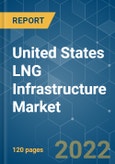The United States LNG infrastructure market is expected to grow at a CAGR of more than 10% during the forecast period. Factors such as growing uses of natural gas in various sectors such as power generation, to have lower carbon emissions for a cleaner environment is expected to drive the market during the forecast period. Moreover, United States has become a net LNG exporter since 2017, owing to an abundance of shale gas, which has led to increased investments in exporting facilities, in turn promulgating the demand for LNG infrastructure in the country. However, volatile natural gas prices lead to decreased exports and a glut of LNG is expected to hinder the market growth.
Key Highlights
- Liquefaction plants segment is expected to dominate the United States LNG infrastructure market, as the country is a net exporter of LNG, leading to the increased requirement of liquefaction facilities.
- As per the Energy Information Administration (EIA), non-OECD Asian countries like China, India, Bangladesh, Thailand, and Vietnam are expected to consume 120 billion cubic feet per day (bcf/d) of natural gas by 2050, outpacing regional natural gas production by 50 bcf/d. Hence, United States is expected to be a major exporter of natural gas to these countries, in turn creating major opportunities for the market players.
- Since 2017, the country has become a net exporter of LNG, becoming the world’s third largest LNG seller in 2019, behind Australia and Qatar with a major shift in the import and export dynamics withing the country. Hence, with increased exports, the LNG infrastructure market is expected to increase during the forecast period.
Key Market Trends
Liquefaction Plants Segment to Dominate the Market
- The United States accounted for over half of all new global liquefaction capacity added in 2019, and is now the world’s third-largest LNG seller and is expected to become the biggest global LNG exporter by in the latter part of the forecast period, overtaking Australia and Qatar.
- The increasing supply of liquefaction capacity in 2019 at a global level was largely bolstered by projects in the United States. Corpus Christi LNG T1-2 (9 MTPA), Cameron LNG T1 (4.0 MTPA), Freeport LNG T1 (5.1 MTPA), Sabine Pass T5 (4.5 MTPA) and Elba Island T1-3 (0.75 MTPA) collectively contributed 55% of the global liquefaction capacity additions.
- Moreover, as of December 2019, 123.3 MTPA of liquefaction capacity was under construction or sanctioned for development globally, with close to 45% of this capacity is in the United States. Therefore, with increased investments for liquefaction plants, the market is expected to grow during the forecast period.
- Further, Sabine Pass LNG, the first LNG export plant in service in the United States, took FID on its sixth train with a 4.5 MTPA capacity and NLNG reached FID on its 8 MTPA expansion plans in December 2019. Also, 350.5 MTPA of liquefaction capacity is in pre-FID stage in the United States, which is likely to drive the market studied.
- Therefore, with major exporting facilities and increasing liquefaction capacity plans in the country, the liquefaction plants segment is expected to be the largest market during the forecast period.
Increasing LNG Exports to Drive the Market
- The United States has been a net exporter of LNG in 2017 through 2019, owing to increases in the country’s natural gas production, declines in natural gas imports by pipeline, and increases in LNG export terminal capacity.
- The LNG export capacity in the country increased from less than 1 billion cubic feet per day (bcf/d) in 2016 to nearly 9 bcf/d by the end of 2019. In 2015, total United States LNG exports were about 28 bcf to seven countries, which reached a high of about 1,819 bcf to 38 countries in 2019. LNG exports accounted for 39% of total U.S. natural gas exports in 2019.
- Moreover, with the increase in demand for LNG in importing countries, the United States has six export facilities online with 15 trains in service in 2019. The six operating LNG export facilities (Sabine Pass, Freeport LNG, and Corpus Christi LNG in Texas, Cove Point LNG in Maryland, Cameron LNG in Louisiana, and Elba Island in Georgia) are all adding production capacity over the next two years, in turn bolstering the market growth.
- Therefore, supported by abundant supplies of shale gas and growing liquefaction capacity, the country’s LNG export has witnessed a significant rise which started with the first commercial LNG cargo shipped from Cheniere’s Sabine Pass in Louisiana in 2016 and is expected to increase during the forecast period.
Competitive Landscape
The United States LNG infrastructure market is fragmented. Some of the key players are Chiyoda Corporation, Bechtel Corporation, McDermott International Inc., Sempra Energy, and Cheniere Energy Inc.
Additional Benefits:
- The market estimate (ME) sheet in Excel format
- 3 months of analyst support
This product will be delivered within 2 business days.








